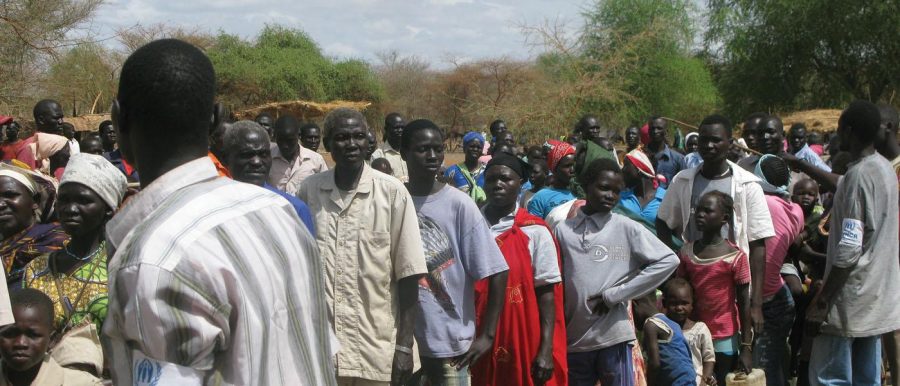Hostility makes it harder for refugees.
In 1987, 5-year-old Duop dend Duop and his friends returned from a walk to find their entire village in South Sudan burned down and desolate. Joined by thousands of other children also displaced by the Second Sudanese Civil War, the group of boys traversed North Africa on foot, seeking refuge in neighboring countries. Today, they are known as the Lost Boys of Sudan.
Duop is one of the fortunate few to live well into his adulthood and make a living in a safe environment. His gratitude was apparent in his interview with The Fourcast.
“God is good,” Duop said. “This country is a welcoming country; it let me come here to make my life better. I am safe, my wife is safe, my children are safe, I sleep easy at night.”
As he spent his last few years in Africa living in Kakuma, an Ethiopian refugee camp, Duop eagerly awaited his adventure to the United States. The foreign land promised independence, security, and opportunity for him, and he expected instant access to these benefits.
“I knew I was going to get up on my own two feet as soon as I got to America. I wanted to get a job, have my own things and be able to support myself,” Duop said.
Duop’s expectations were met. Immediately after his arrival in Dallas on Feb. 14, 2001, he received support from a church group dedicated to assisting refugees. Middle School math teacher Dr. Jim Wohlgehagen is a part of this group.
“We want to help out in any way we can. We started by welcoming them from the airport and then we settled them into their new homes,” Wohlgehagen said. “We brought them groceries every week, taught them how to cook, taught them how to drive, and we signed them up for English and civics classes.”
Unfortunately, many refugees today do not find themselves in as favorable a circumstance upon their entry into the United States. Apart from obtaining legal papers to cross the U.S border and enduring the lengthy citizenship process, refugees must also contend with inadequate housing and resources, a language barrier, cultural isolation and a nativist sentiment exhibited by some Americans.
According to the American Immigration Council, The United States receives approximately 52,000 requests for asylum per year. A 2016 Pew Research study reports that a record number of Muslim refugees were admitted last year under the Obama administration. The Trump presidency has been significantly more adverse to Muslim refugees as evidenced by the President’s attempt to institute his travel ban in January 2017. This hostility takes a direct toll on on refugees as it impacts their support systems.
Refugee Services of Texas is a Dallas-based social service agency dedicated to supporting those fleeing from persecution. Since 1978, RST has been providing asylum to a number of refugee families. Recently, the organization has been facing financial complications.
Sandy Stroo, Hockaday English as a Second Language teacher, is concerned that the conditions for incoming refugees are progressively deteriorating.
“I work with Refugee Services of Texas to help settle families in and get them up on their own two feet. RST has a lot of trouble with government funding, and we all try our best to accommodate all the refugees we can in the area, but we are unable to cope with the influx,” Stroo said.
Stroo works to welcome refugees through the First Presbyterian Church. She currently teaches English to a Burmese refugee family.
The mother, Shomjida Begum, and her three children Anwar (9), Roksana (7), and Mohammed (5) are Rohingya—Muslim Indo-Aryan people from Myanmar. They traveled to America from a Thai refugee camp on Jan. 25 without Begum’s hus- band, Nour, who sought work in Malaysia. Since Begum’s English is limited, her interview with The Fourcast was facilitated by her oldest son, Anwar.
“I am very happy to come here. I come from Burma. I went to Bangladesh and Thailand, but America is the best,” Begum said. “Even so, I am a little sad because I need more help with money. My funding is being cut in three months and I am very worried for my children.”
But Stroo plans on continuing to aid Begum even after her funding is cut.
“I am disappointed and angry at this situation. We have 90 days as a church or- ganization to try to put her on her feet and help her gain sustainability,” Stroo said. “We need more resources. As a rich nation, we should be able to handle it, but from my experience with this Rohingya family, I know that once refugees get here, they probably don’t get the help that we should be providing.”
Despite efforts from refugee advocates like Stroo, Hassan and Wohlgehagen to accept refugees, the consensus on this crisis is split. The current political climate harbors controversy regarding the stringent border regulations. Some people, including refugees themselves, are opposed to the open border policy.
“If somebody wants to come here with an intention other than to make themselves better, they need to be kept out,” Duop said. “Everyone has to be patient and wait for their opportunity to come.”
Neha Dronamraju – Asst. A&E Editor







